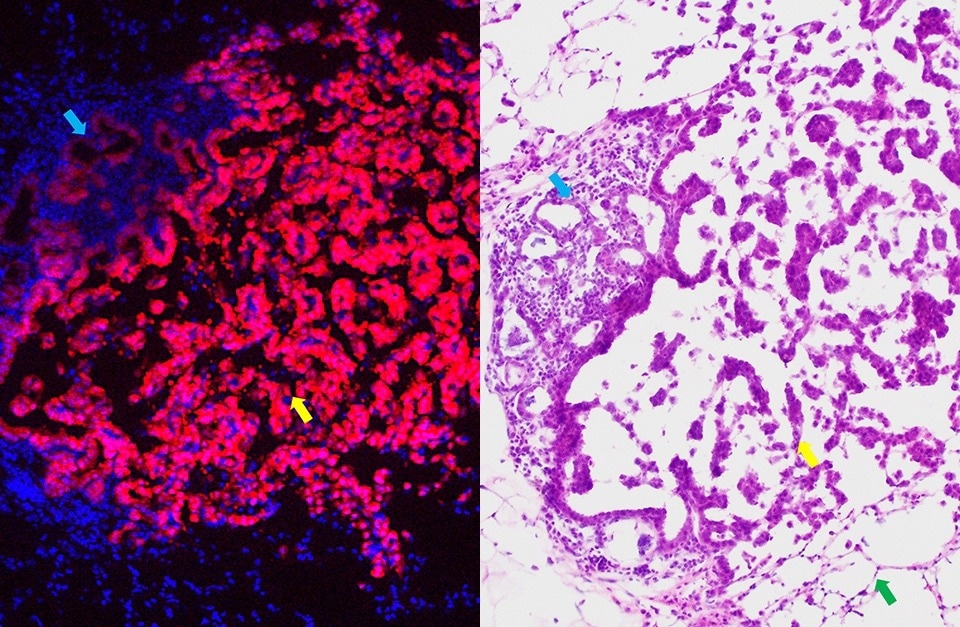The National Cancer Institute at the National Institutes of Health has awarded a multidisciplinary team of Weill Cornell Medicine researchers a five-year $5.7 million grant to support a center dedicated to creating messenger RNA (mRNA) vaccines to prevent the development of cancer in at-risk groups.
 Part-solid lung cancer lesions showing a region with proliferation along the surface of intact alveolar walls without invasion (yellow arrow) and developing an invasive component (blue arrow). Normal lung region is shown (green arrow). Image Credit: Mitchell Martin and Dr Vivek Mittal
Part-solid lung cancer lesions showing a region with proliferation along the surface of intact alveolar walls without invasion (yellow arrow) and developing an invasive component (blue arrow). Normal lung region is shown (green arrow). Image Credit: Mitchell Martin and Dr Vivek Mittal
The Cancer Prevention-Interception Targeted Agent Discovery Program (CAP-IT), a cooperative research network funded by the NCI, was established to find drugs that prevent or intercept cancer in high-risk populations. The Weill Cornell Medicine CAP-IT Center for LNP RNA Immunoprevention was chosen as one of two founding members of the program.
Prevention is really the best cure for cancer.”
Dr Steven M. Lipkin, Principal Investigator, Project Leader, and Vice Chair for Research, Department of Medicine, Weill Cornell Medicine
The goal of Dr Lipkin and his team’s work on vaccines containing mRNA—a molecule that gives cells instructions to produce particular proteins—is to stimulate the immune system to recognize and eliminate cancer cells bearing these proteins at an early stage.
This tactic could prevent malignant cell populations from amassing sufficient mutations to circumvent the immune response of the body. Additionally, the strategy aims to stop the development of a tumor microenvironment, which is made up of molecules, cells, and blood vessels that feed the cancer and stifle the immune system.
The vaccines will employ the same mRNA technology as the Moderna and Pfizer COVID-19 vaccines, which were constructed using data from at least ten years of earlier cancer-related scientific research.
The mRNA cargo will be enclosed in a fatty shell made of lipid nanoparticles that are being created in the lab of Dr Shaoyi Jiang, the Robert S. Langer ‘70 Family and Friends Professor in the Meinig School of Biomedical Engineering on Cornell’s Ithaca campus, to protect it from degradation.
With the aim of conducting clinical trials within the following five years, mRNA vaccine research will begin in mice. The researchers intend to carry out numerous studies.
The first is to create and test a Lynch syndrome mRNA vaccine, a genetic condition that is inherited and significantly raises the risk of developing colon and other cancers before the age of 50. The research group intends to modify these vaccines so that they stimulate T cells in the immune system to fight cancer.
Dr Lipkin added, “T cells recognize malignant cells, bind to them, and kill them.”
Dr Lipkin is also the leader of the Cancer Genetics and Epigenetics Program in the Sandra and Edward Meyer Cancer Center at Weill Cornell Medicine.
The second project involves creating and evaluating an mRNA vaccine for lung non-solid nodule (NSN) pre-malignant neoplasms, which are precancerous lung lesions.
There is currently no effective way of managing these lesions so they don’t progress to cancer, other than surgically taking them out.”
Dr Nasser Altorki, Study Principal Investigator and Chief, Thoracic Surgery, Weill Cornell Medicine
One day, scientists want to create an mRNA vaccine that targets populations of shared antigens, or foreign or abnormal particles that cause an immune response, in lung cancer patients.
Dr Altorki, who is also vice chairman of cardiothoracic surgery, the David B. Skinner, M.D., Professor of Thoracic Surgery, and director of the Meyer Cancer Center’s Experimental Therapeutics Program, suggested that another option is to create personalized vaccines that are targeted at the variations in the genetic makeup of each patient’s tumor.
Now is the right time to develop these lung cancer vaccines. We know a lot about the immunologic changes that allow lung tumors to grow, as well as some of the associated mutations.”
Dr Timothy McGraw, Study Principal Investigator and Professor, Biochemistry in Cardiothoracic Surgery and Biochemistry, Weill Cornell Medicine
For evaluating the therapeutic potential of vaccines against cancer-specific proteins identified in patients, preclinical models of premalignant lung cancer are essential. The Mittal laboratory recently created and characterized a lung cancer oncogene-driven model that resembles the human premalignant disease because such a model was not previously available.
Principal investigator Dr Vivek Mittal, who is a Gerald J. Ford-O. Wayne Isom Professor in Cardiothoracic Surgery, and Director of the Neuberger Berman Lung Cancer Laboratory, stated, “We were pleasantly surprised to observe very similar cellular and molecular changes in mice and human.”
The researchers are pursuing other mRNA vaccination projects with additional funding outside of this grant, including focusing on infection with Fusobacterium nucleatum, a bacterium that encourages colon cancer development, and Constitutional MisMatch Repair Deficiency (CMMRD), a pediatric cancer syndrome.
Dr Lipkin concluded, “We envision this program as a platform for the creation of several types of cancer vaccines. We have the technology to make vaccines that carry different mRNA cargo to activate the immune system in various ways to prevent cancer.”